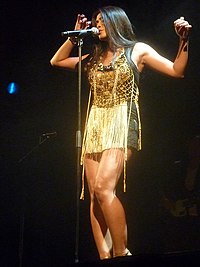User:Faeydoro/Sandbox 3
This article is incomplete because it is pending further input from participants, or it is a work-in-progress by one author. Please comment on this article's talk page to share your input, comments and questions. Note: To contribute to this article, you may need to seek help from the author(s) of this page. |
| K-Pop | |
|---|---|
 The first interantionally recognized k-pop artist Sapariah in 2012 | |
| Native name | ᮊᮨᮕᮧᮕ᮪, kepop` |
| Etymology | short for "Kapulakan pop music" |
| Stylistic origins | |
| Cultural origins | late 80s and early 90s Kapulaka |
K-Pop (Kapulakan:ᮊᮨᮕᮧᮕ᮪ Steiner-Richthofen: kepop`), short for kapulakan popular music is a form popular music originating from Kapulaka. While Kapulka already developed a thriving pop and rock scene since the late 1960s the term K-pop usually only applies to the popular music scene which developed in the late 80s and early 90s. While originally mostly drawing from weranian pop and rock k-pop massively diversified and nowadays draws inspiration from a lot of differetn kinds of music from all over the world. Seeing a steady growth since the mid 90s K-Pop reached a global audience for the first time in 2007 with the singer Sapariah. Following her success throughout coius the Kapulakan government decided to support this music industry in developmet through the passing of several laws providing musicians with extra funding for their projects. This was done both out of an desire to use it to grow kapulakan prestige in the world but also to keep younger kapulakans in the country by providing new job opportunities. Throughout the 2010s K-pop grew even more popular worldwide with some artists like Nugraha or KND becoming interantional stars.